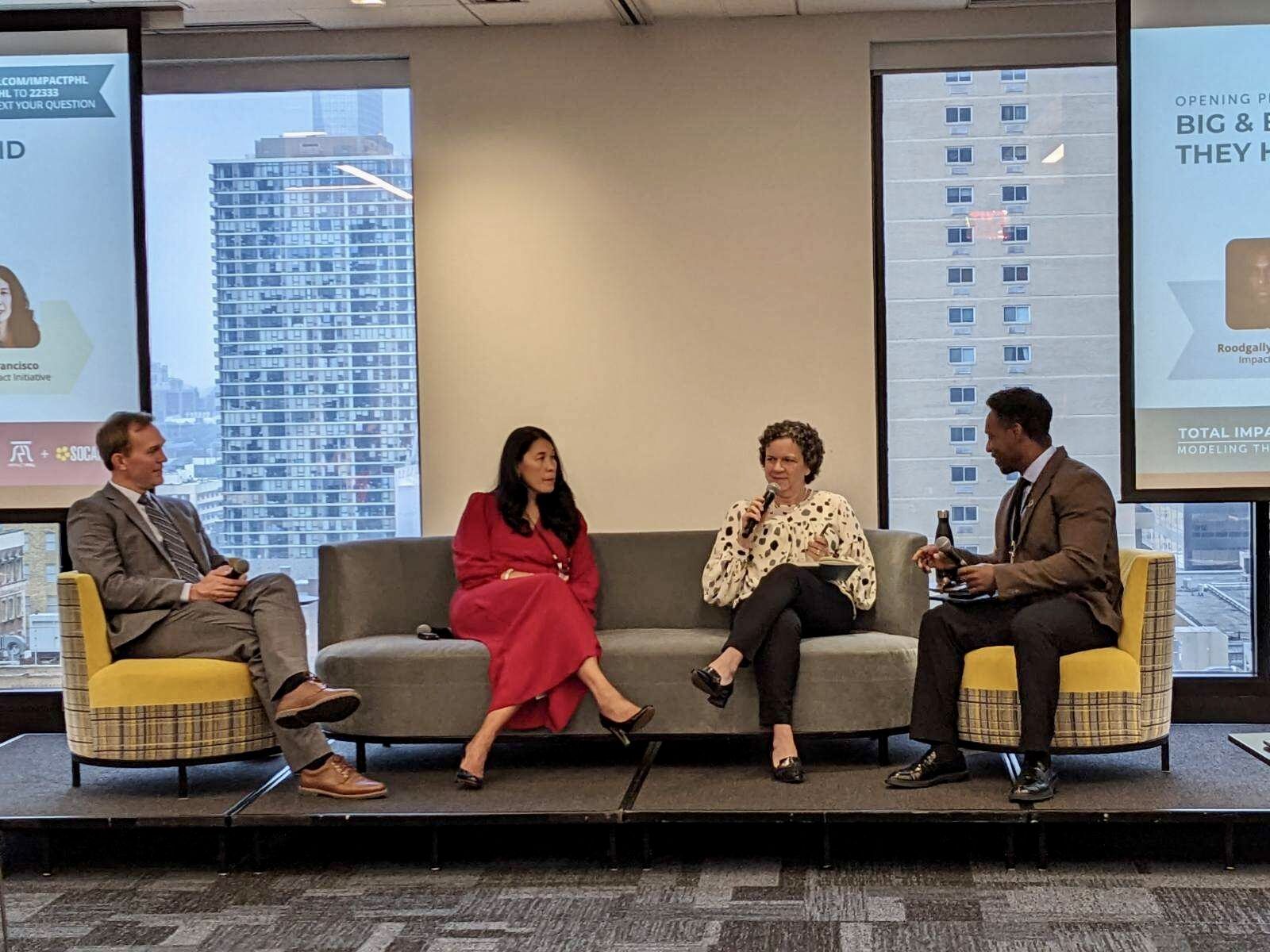Greetings, Agents of Impact!
The ninth Foro Latinoamericano de Inversión de Impacto (the Latin American Impact Investing Forum, or simply “the FLII”), just ended in Mérida, Mexico, has a reputation as a wellspring of impact investing activity in one of the most dynamic regions of the world. After this week, ImpactAlpha can report the reputation is well-deserved. We met dozens of the committed entrepreneurs, fund managers and “capacity builders” creating a vibrant impact investing ecosystem, and enjoyed the welcome of a close-knit community.
We met Yucatecan social entrepreneurs and gathered subscribers and friends at our own Agents of Impact in Latin America side event (big thanks to U.S. Consul General Courtney Beale and Halloran Philanthropies’ Tony Carr). Kellogg School of Management students Gabriel Meizner, Jack Bugas, Shifali Gupta, Justin Hendrix, Rohan Jha fanned out across the conference to help ImpactAlpha gather intelligence and make connections. The theme of the FLII was the tech-driven “4th Industrial Revolution,” but as always, it’s all about the people.
– David Bank, Dennis Price and Jessica Pothering
Featured: The Brief’s Big 7
- 50 deals that signal Latin American impact investing growth. Ventures in South and Central America are raising capital to mitigate and adapt to climate change. Entrepreneurs are finding ways to close the financing gap for small businesses. Fintech firms are expanding access to financial services. Education ventures are creating opportunities for the two-thirds of Latin America’s young people that don’t advance into higher education. And a growing number of companies are delivering products and services to the 15 million family farms (including 10 million subsistence farmers) in Latin America and the Caribbean. In the past year, ImpactAlpha has tracked more than 50 deals in the region. Take a look.
2. For Latin America impact fund managers, raising the second fund can be as hard as the first. First-time fund managers that make it through the often long and taxing slog of building an investment thesis, assembling a deal pipeline and attracting limited partners can look forward to… just as much difficulty raising Fund II. Continuing obstacles and lingering biases against impact investing in emerging markets have limited the overall growth of impact funds in Latin America. “The movement has grown, but not fast enough,” says Halloran’s Tony Carr. Find out why.
3. Overheard at ‘the FLII.’ We’re still combing through our notebooks, but a few themes emerged.
- Real value. Startups like Frogtek, Laboratoria and Clínicas del Azúcar are delivering basic business infrastructure, job skills, and health services, respectively, to create opportunities and improve livelihoods. Such businesses are key to continued progress in a relatively peaceful, overwhelmingly urban and increasingly middle-class Latin America.
- Resilient investments. Essential services in local, emerging markets make for high-impact investments. They are also resilient in the face of volatile global markets, says Capria Network’s Will Poole. (see, “Hedge in a volatile market: Companies meeting basic needs in emerging markets”)
- Changing systems. Impact investments are in fashion, but sustainable procurement by corporations may be a more effective way to drive real systems change.
- Engineered exits. Financing mechanisms that enable exits through equity redemptions, revenue-based loans and other mechanisms can leave ownership in the hands of mission-driven founders and expand the universe of investable deals in emerging markets. Putting ‘capital at the service of entrepreneurs’ was the spirit of a masterclass on structured exits featuring Acumen, Adobe Capital, Candide Group, EcoEnterprises, IDB Lab and Transform Finance.
- The rest of the chatter.
- Agent of Impact: Clara Barby, Impact Management Project. Clara Barby has helped forge a consensus among impact investors for how to talk about, measure and manage impact. Expect to hear more about the five dimension of impact: what, who and how much impact, the level of risk – and the contribution that can legitimately be credited to the investor. As head of the Impact Management Project, Barby has brought early impact investors like Root Capital, Vox Capital and Nesta together with big pension funds and global asset managers like PGGM, BlackRock, AXA, UBS, Hermes and Barclays. With such consensus, investors are able to worry less about impact frameworks and more about actual impact. Widespread impact measurement and management will result in a very big tent, says Barby, also a partner at Bridges Fund Management. Inside that tent, she says, ‘We can differentiate businesses and investments based on their impact performance.” Follow ImpactAlpha on Instagram.
- Q&A: “Raising the bar for impact management practice.”
- The Call. “Underwriting – and optimizing – for impact.”
- Weekly roundup. Follow the talent with ImpactAlpha’s weekly report on career moves, job openings, events and opportunities.
- Building entrepreneurial ecosystems inside Opportunity Zones. The movement to accelerate business-creation in mid-tier cities across America was growing even before new capital-gains tax breaks made low-income neighborhoods one of the year’s hottest investment themes. (“The provision has unleashed a flurry of investment activity by wealthy families, some of Wall Street’s biggest investors and other investors who want to put money into projects ostensibly meant to help struggling Americans,” writes The New York Times.) Now, the tax incentives are accelerating the accelerators. New Orleans-based Launch Pad raised $1.33 million to put co-working spaces and business incubators in Opportunity Zones around the country. Already in New Orleans, businesses supported by Launch Pad have created 5,000 jobs, raised $160 million and leased 600,000 square feet of office space (Launch Pad already had facilities in or near Opportunity Zones in Newark, Nashville and Memphis). Ross Baird’s Blueprint Local and AOL founder Steve Case’s Revolution also are leveraging Opportunity Zone incentives to help entrepreneurs far from Silicon Valley and other coastal hubs. Jump in.
6. Deals of the week. Drink from the deal firehose all week long on ImpactAlpha.com. A few that stood out:
- Food and farmer finance. Emerging markets Agri-Business Capital Fund secures €50 million… Root Capital chases ‘social impact incentives’ in loans to Latin America agribusinesses… Nuveen invests $10 million in Revolution Foods’ healthy school lunches.
- Innovative finance. Atlanta raises $14 million environmental impact bond.
- Corporate impact VC. Mexican coding bootcamp Holacode attracts GINcapital… Shell goes all in on solar-storage venture Sonnen.
- SDG finance. PG Impact closes its €210 million fund targeting the Global Goals.
- Impact investors think beyond equity. Investing in young startups at the frontier of innovation should make a lot of sense for impact investors. But many impact investors avoid such early-stage businesses because of perceived financial risks, Village Capital’s Allie Burns writes in a guest post on ImpactAlpha. “Impact investors have an opportunity to do things differently.” Burns advocates alternatives to equity such as revenue-sharing agreements that repay investors from a cut of earnings as businesses grow (see No. 3, above). Go deeper.
- Capital access lab. Kauffman Foundation has $3 million for investment models, including revenue-based investing, performance-based equity, and employee stock ownership, that increase capital investment to underserved entrepreneurs.
— February 22, 2019.











